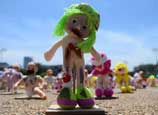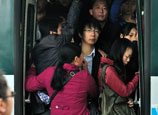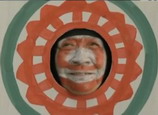
When Chen was apprehended, he confessed that he had killed the four seniors on the same day. He also admitted killing the three other elderly residents in a nearby village a week or so earlier.
Very few young people live in Heigou village, the population of which mainly consists of seniors and infants. The young have moved away in search of work and few of them can afford to provide food and lodging for their elderly parents in their adopted home towns, while the older children live in the local town where they attend school. That means approximately 30 households in the village consist exclusively of seniors, according to the village leader Weng Liancheng.
The case has highlighted the reality of life for "left-behind seniors" - a phrase used to describe rural dwellers aged around 60 or older, whose children have moved to the urban areas - many of whom live alone, eat alone and rarely receive phone calls or messages from their departed offspring.
Some have no idea where their children are. For example, Cheng Deguang, 80, only knows that his two sons are still alive. "They have their own lives and the burden has already been so heavy for them," he said. "I don't expect them to do more for me."
His younger son has not been home for spring festival for some years. Cheng's voice softened slightly on the other end of phone when he spoke about the boy, but still supports the idea that young people should go out to live their own lives.
Rural versus urban
There is an obvious disparity between the elderly in urban and rural areas. Those dwelling in urban areas can usually rely on their children for support, both in terms of finances and accommodation. The rural elderly are often not so fortunate. Some receive financial help from their children, but despite recent improvements in the social support system, some are struggling and live close to the poverty line, barely able to survive on an annual income of 2,300 yuan ($374).
"Left-behind seniors are one of the most disadvantaged groups in society. Sometimes they lack security awareness and usually have little understanding of the law or their rights," said Wang Junwen, a professor at the school of humanities and social sciences at East China Jiaotong University.
The left-behind seniors are usually poorly educated and reliant on handouts from their children. Moreover, the age demographic in many villages resembles an inverted pyramid, whereby the oldest residents are in the majority, according to Wang.
A sense of foreboding also hangs over the elderly rural poor. Last month, seven seniors were murdered within the space of two weeks in the backwoods of Shaanxi province. Some experts saw the tragedy as a warning of the serious security issues facing elderly people left to fend for themselves in the countryside.
In early April, Chen Jun, a 20-something who had just been released from prison, arrived at Heigou village in mountainous Shangnan county, an isolated spot in Shaanxi. Early in the evening, under the pretext of buying sheep, Chen knocked at the door of Sun Kaicheng, a 59-year-old who lived with his wife, 49.
"Older people in the villages often have to face life's daily difficulties with little or no support. That is the key issue we should address," said Shi Renbing, a professor at Huazhong University of Science and Technology, who specializes in rural demographics.
"The rural culture needs to be rebuilt to foster a return to the traditional countryside culture, such as close family ties and traditional value systems, to strengthen the moral code and behavior patterns," said Wang.
A rising divorce rate, a rural welfare system still under construction and a rising dropout rate at primary and middle schools mean security is only one factor in the lives of the rural elderly. For example, 92 percent of elderly men dwelling in the countryside have to work in the fields to support themselves, even well into later life.


















 Chinese applicants wish a new life on Mars
Chinese applicants wish a new life on Mars


![]()
